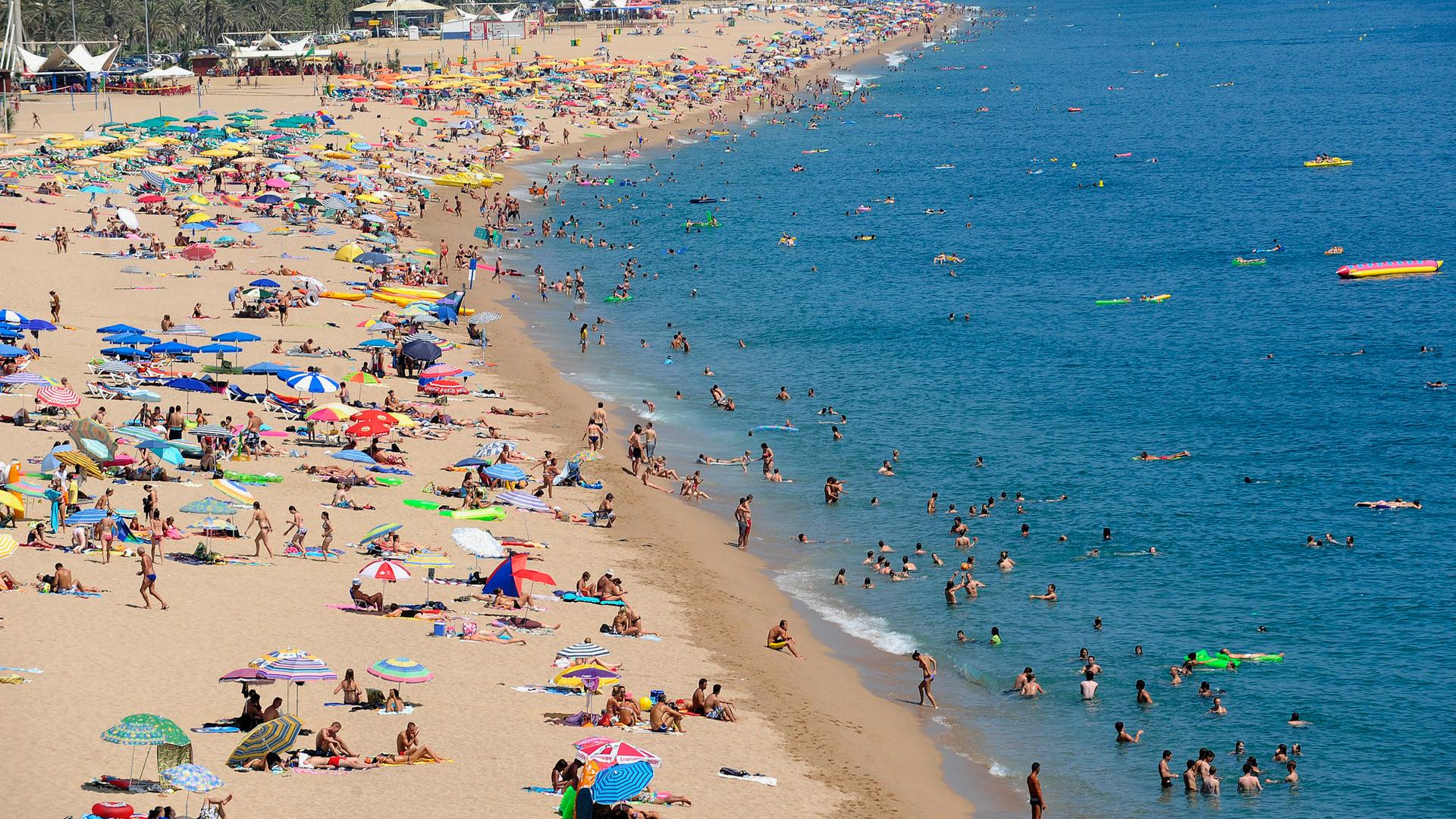Iryna Levyk fled Ukraine with her two kids at the onset of the Russian invasion, urged by her husband, who had to stay behind.
They found shelter in Calella, a seaside town in Spain where hotels left empty by the coronavirus pandemic were turned into safe havens for refugees.
Kids played in the hotel hall, and families from all over Ukraine got together and supported each other.
Related: Refugees find a welcome in Catalan Guissona’s ‘Little Ukraine’
“It was very warmhearted,” Levyk recalled. “We were all on the same boat.”
But as the weather got warmer, and COVID-19 restrictions were lifted, tourists began to flock in, forcing Ukrainian families out.
During the last week of June, Levyk and her children had to pack up and go to another hotel in Calella.
“It’s completely normal,” she shrugged. “This is a touristic place, and this is what they live off [of].”
Calella, a town of nearly 20,000 in the northwestern autonomous region of Catalonia, is a poster child for one of the country’s most popular touristic assets: beach towns on the Mediterranean coast.
With the local economy relying heavily on tourism, the long-awaited arrival of international visitors this summer is seen by some as the light at the end of the tunnel.
It’s not only Calella — it’s Spain as a whole. After a two-year hiatus from the coronavirus pandemic, tourism is back. The turning point came this past April with the Easter holiday: Tourists spent $8.1 billion — nearing prepandemic levels, and 10 times more than the same month a year ago.
But for Ukrainian refugees, the return of tourism is also revealing just how challenging it is to find long-term accommodation.
Moving around
In Spain, 120,000 Ukrainians have been granted asylum since the war began. Calella has hosted around 1,500 of them at some point in the past months, and more than 600 are still there, according to local officials.
Spain’s refugee reception system, which is run with support from nonprofits such as the Red Cross, provides people with shelter upon their arrival.
Unlike other European countries, which relied more heavily on local families to host refugees, Spain has used its vast network of hotels to provide shelter.
But more recently, many Ukrainians have had to leave their hotel rooms, which had been booked by tourists paying high season fees.
It’s something that refugees are warned about — they might be taken somewhere else at any point while they’re in the early stages of the program.
“They don’t have the right to choose the place where they are going to be staying.”
“They don’t have the right to choose the place where they are going to be staying,” said Cristina Domínguez, the coordinator of the international protection program of the Red Cross.
But the longer refugees stay in one place, even if they know it’s provisional, the more familiar they get with their new community, and the harder it will be to leave.
A councilor for the local government of Calella, Montse Mateu, said that some Ukrainian families had a hard time leaving the town, but otherwise, had no option if they were to remain beneficiaries of the reception program.
“They would be left with zero, with no aid, so it’s better for them to stay inside the program,” Mateu said.
Still, she takes pride in how Calella has welcomed Ukranians and is saddened by media reports about refugees being ejected from hotels, arguing that everybody is doing their best to help them.
“Nobody has been kicked out,” she said.
Some families in Calella have opened their homes to Ukrainian families. Such is the case of Maria Teresa Pla, who is hosting Myroslava Hookin and her two kids.
As a child, Hookin used to spend the summers in Calella with Pla.
When the war started they got in touch again, and Pla agreed to have her stay with her two children. However, getting a home of their own will be hard.
Affordable housing in short supply
Leyk said that she is looking forward to finding a job and getting her own apartment with financial support from the government. But that may take time.
While Calella has plenty of hotels, cheap apartments are in short supply.
In Spain, the rate of affordable housing per 100 people is one of the smallest in Europe: 0.9, four times below the EU average of 3.8, according to a 2020 report by the Spanish government.
There are 290,000 apartments that qualify as social housing — roughly the same number as those categorized as tourist accommodation.
For now, Levyk said that she is happy to stay in the hotel — but while she may live next door to tourists, she is not on a vacation.
“Every day, every minute, in our heart, we remember why we are here. And we’re really grateful for this.”
With no end in sight for the war, Levyk hopes that Western allies will double down on support for her country.
“Ukraine really needs help with closing the sky, because many civilians including children are dying every day from bombs and rockets,” she said.
In the meantime, she has no option but to wait and continue to settle down in Spain.
“It would be the most unbelievable and great thing that the war finishes and we can all safely go home, but for now, we have what we have,” she said.
Her kids are on school break, which means that she can’t look for a job now. School resumes in September, which coincides with the end of the tourist season, so maybe finding an apartment will be easier then.
